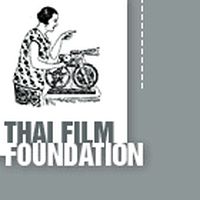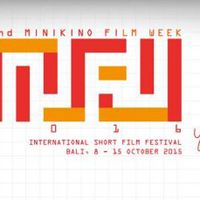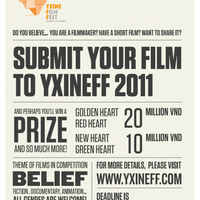Bangkok's Nights Show Shorts
Notes from the Multicolored 8th Thai Short Film and Video Festival
Film curator Tintin Wulia gives us the scoop at the 8th Thai Short Film and Video Festival.
Antonin Peretjatko, 30, was just another assistant cameraman who didn't have much money. So he borrowed a 16mm camera from his former film school, and shot his film with the cans of celluloid he has been saving from work. Only after his film ‘Changement de trottoir' (14 minutes, France 2004) started to be screened everywhere and got nominated in the Clermont-Ferrand International Short Film Festival did funding started to roll in.
For Chris Stenner, 33, it was quite a different experience, nevertheless a heartening one. His school took the whole responsibility of producing his film ‘Das Rad' (8 minutes, Germany 2003), so he personally didn't have any fuss with money. However, for about six or seven months after ‘Das Rad' was released, they heard nothing positive from any festivals. His team kept being optimistic and continued to send their preview tapes around. Only in the eighth month did things really get better: ‘Das Rad' ended up as a nominee for the Oscars. “So never be discouraged – just be sure that you've done your best, and keep sending your preview tapes around to festivals. You'll get there,” was Chris' tip.
It was not just an ordinary tipping session. Chris, Antonin, and three other directors from Europe (Iao Lethem, Jens Jonsson, and Zaida Bergroth), attended the screening of their shorts as part as the 8th Thai Short Film and Video Festival, organized by the Thai Film Foundation. The festival, with a core team of only three Thai ladies working round the clock all year within the direction of Chalida Uabumrungjit, has its biggest number of international guests this year. A bunch of about 15 guests from Asia and Europe was getting all over the jovial Bangkok by the invincible tuk-tuk (local vehicle) and the fascinating Chao Praya Express Boats, 7 to 17 August 2004; watching short films, getting to know each other, and – eventually – shopping for props.
The main venue was located at 14 October Memorial, a monument for student revolt in the famous Khao San Road vicinity, where fun defines its name. “This festival is amazing – other festivals would only give us a map. And it's thrilling to know how the local filmmakers are very much involved as volunteers – it's an honor,” an international guest commented. However, apart from the fact that the city itself is a label for amusing, exotic things, the festival itself offers many remarkable programs besides its Thai and International Competition sections.
‘Shooting Rhymes and Cutting Verse' from the British Council, for one, shows an hour's worth of thirteen films based on poetry, saluting the transfer of aesthetics between words on a page to images on screen. Two sessions of about 80 minutes each present the Best of Clermont-Ferrand, showing shorts with duration from 2 minutes (Whizeewhig, Chihcheng Peng, USA 2002) to 48 minutes (La Chatte Andalouse, Gérald Hustache-Mathieu, France 2002).
“Even though we call it a short film and video festival, our festival doesn't only screen short films. We also screen other independent films regardless of duration,” says Chalida. Well, we don't really mind, as long as it's as entertaining as Apichatpong's “The Adventure of Iron Pussy” (by directors Apichatpoing Weerasethakul and Michael Shaowanasai, 85 minutes, Thailand 2003). Having its first screening in Bangkok after traveling to many festivals throughout the world, the theater was packed with laughing audience, sitting on proper chairs as well as on the floor and even on the stage near the screen.
The lively Q&A session, attended by actor/co-director Michael Shaowanasai, answered questions ranging from mere technical (“Sorry, but was it your real legs in the film, Michael? It's amazing how smooth it was!” – after which Michael suggested the women audience never to wax their legs because “It's painful!”) to conceptual (“How did you decide to give tribute to the old Asian-style film?”). ‘CUT' (13 minutes, Singapore 2004) the new Royston Tan film – challenging the Singaporean censorship board even further – also totes up to the atmosphere as the opening short for this particular session.
The atmosphere, unfortunately, was missing in the ‘Birth of Seanéma' (Sasithorn Ariyavicha, 70 minutes, Thailand 2004), a screening that deserves more Q&A and discussion session for its experimental nature. The silent film with strikingly contemplative visuals left some of the international guests completely out of context. Apart from appreciating the invented alphabet seemed to be especially made for the film, the audience was left clueless and hoping to ask questions to you-don't-know-who. “It was raining outside and some water dropped from the ceiling of the theater, and I was hoping that that was a soundtrack from the film; it really attracted my wandering brain back to the film,” a guest filmmaker, an experimental filmmaker himself, commented.
The most appealing Thai-specific segment came from the Thai National Film Archive. The archive contributed a session of three heritage films, one of which ‘The Magic Ring' (30 minutes, King Prajadhipok, Thailand 1929) presented with an ensemble of Thai traditional music. Established in 1984 as a project under the Museum Division with zero budgets, four temp staffs, an empty building and a table made of a door panel, the Thai National Film Archive also hosted the festival's international guests in its museum, a humble gem dedicating itself to Thailand's long history of cinema.
“This is our first year of even having international juries for our international competition,” recounts Chalida, the festival director for eight year. “It was quite difficult to find funding, however the ASEF has been very supportive to us in inviting the five important filmmakers from the contemporary short films scene”.
One of the international jury panel members, Amaia Torrecilla, is the festival director of Barcelona Asian Film Festival, the first Asian film festival in Spain. Some international short-film enthusiasts also came to the festival at their own expenses, like some young organizers from Minikino, a Bali-based organization programming and distributing short films in and out of Indonesia. “Visiting a festival like this is quite new to us,” says Thilma, Santi, and Butet, program assistants for Minikino, “but we'll definitely bring something back home and apply this experience to our next program contribution in the 6 th Jakarta International Film Festival.”
It was not always easy, and after eight year, “there's a danger of it becoming a mere ‘employment' for me. I need something different every year and we hope to transfer all the knowledge to a new team of organizers, but that can't seem to happen in the near future.”
Speaking of something different each year, Chalida recently networks more with curator friends from Southeast Asia, as part of the S-Express group (with fellow curators Amir Muhammad, Malaysia and Yuni Hadi, Singapore) that exchange short films from Malaysia, Singapore and Thailand. Indonesia is a recent addition in this regional initiative group that will meet in the Asian Film Symposium this coming September. Later this year, bringing eight years of festival experience with her, Chalida will be a member of the jury panel for the 6 th Jakarta International Film Festival's Short Competition.
More about S-Express as part of the Asian Film Symposium at The Substation in Singapore.
Details of the Thai Short Film & Video Festival
* Tintin Wulia, based in Indonesia, gradually became a short film enthusiast after attending screenings of her shorts in various festivals. She was also a member of international jury panel of the 8th Thai Short Film and Video Festival.
Notes from the Multicolored 8th Thai Short Film and Video Festival
Film curator Tintin Wulia gives us the scoop at the 8th Thai Short Film and Video Festival.
Antonin Peretjatko, 30, was just another assistant cameraman who didn't have much money. So he borrowed a 16mm camera from his former film school, and shot his film with the cans of celluloid he has been saving from work. Only after his film ‘Changement de trottoir' (14 minutes, France 2004) started to be screened everywhere and got nominated in the Clermont-Ferrand International Short Film Festival did funding started to roll in.
For Chris Stenner, 33, it was quite a different experience, nevertheless a heartening one. His school took the whole responsibility of producing his film ‘Das Rad' (8 minutes, Germany 2003), so he personally didn't have any fuss with money. However, for about six or seven months after ‘Das Rad' was released, they heard nothing positive from any festivals. His team kept being optimistic and continued to send their preview tapes around. Only in the eighth month did things really get better: ‘Das Rad' ended up as a nominee for the Oscars. “So never be discouraged – just be sure that you've done your best, and keep sending your preview tapes around to festivals. You'll get there,” was Chris' tip.
It was not just an ordinary tipping session. Chris, Antonin, and three other directors from Europe (Iao Lethem, Jens Jonsson, and Zaida Bergroth), attended the screening of their shorts as part as the 8th Thai Short Film and Video Festival, organized by the Thai Film Foundation. The festival, with a core team of only three Thai ladies working round the clock all year within the direction of Chalida Uabumrungjit, has its biggest number of international guests this year. A bunch of about 15 guests from Asia and Europe was getting all over the jovial Bangkok by the invincible tuk-tuk (local vehicle) and the fascinating Chao Praya Express Boats, 7 to 17 August 2004; watching short films, getting to know each other, and – eventually – shopping for props.
The main venue was located at 14 October Memorial, a monument for student revolt in the famous Khao San Road vicinity, where fun defines its name. “This festival is amazing – other festivals would only give us a map. And it's thrilling to know how the local filmmakers are very much involved as volunteers – it's an honor,” an international guest commented. However, apart from the fact that the city itself is a label for amusing, exotic things, the festival itself offers many remarkable programs besides its Thai and International Competition sections.
‘Shooting Rhymes and Cutting Verse' from the British Council, for one, shows an hour's worth of thirteen films based on poetry, saluting the transfer of aesthetics between words on a page to images on screen. Two sessions of about 80 minutes each present the Best of Clermont-Ferrand, showing shorts with duration from 2 minutes (Whizeewhig, Chihcheng Peng, USA 2002) to 48 minutes (La Chatte Andalouse, Gérald Hustache-Mathieu, France 2002).
“Even though we call it a short film and video festival, our festival doesn't only screen short films. We also screen other independent films regardless of duration,” says Chalida. Well, we don't really mind, as long as it's as entertaining as Apichatpong's “The Adventure of Iron Pussy” (by directors Apichatpoing Weerasethakul and Michael Shaowanasai, 85 minutes, Thailand 2003). Having its first screening in Bangkok after traveling to many festivals throughout the world, the theater was packed with laughing audience, sitting on proper chairs as well as on the floor and even on the stage near the screen.
The lively Q&A session, attended by actor/co-director Michael Shaowanasai, answered questions ranging from mere technical (“Sorry, but was it your real legs in the film, Michael? It's amazing how smooth it was!” – after which Michael suggested the women audience never to wax their legs because “It's painful!”) to conceptual (“How did you decide to give tribute to the old Asian-style film?”). ‘CUT' (13 minutes, Singapore 2004) the new Royston Tan film – challenging the Singaporean censorship board even further – also totes up to the atmosphere as the opening short for this particular session.
The atmosphere, unfortunately, was missing in the ‘Birth of Seanéma' (Sasithorn Ariyavicha, 70 minutes, Thailand 2004), a screening that deserves more Q&A and discussion session for its experimental nature. The silent film with strikingly contemplative visuals left some of the international guests completely out of context. Apart from appreciating the invented alphabet seemed to be especially made for the film, the audience was left clueless and hoping to ask questions to you-don't-know-who. “It was raining outside and some water dropped from the ceiling of the theater, and I was hoping that that was a soundtrack from the film; it really attracted my wandering brain back to the film,” a guest filmmaker, an experimental filmmaker himself, commented.
The most appealing Thai-specific segment came from the Thai National Film Archive. The archive contributed a session of three heritage films, one of which ‘The Magic Ring' (30 minutes, King Prajadhipok, Thailand 1929) presented with an ensemble of Thai traditional music. Established in 1984 as a project under the Museum Division with zero budgets, four temp staffs, an empty building and a table made of a door panel, the Thai National Film Archive also hosted the festival's international guests in its museum, a humble gem dedicating itself to Thailand's long history of cinema.
“This is our first year of even having international juries for our international competition,” recounts Chalida, the festival director for eight year. “It was quite difficult to find funding, however the ASEF has been very supportive to us in inviting the five important filmmakers from the contemporary short films scene”.
One of the international jury panel members, Amaia Torrecilla, is the festival director of Barcelona Asian Film Festival, the first Asian film festival in Spain. Some international short-film enthusiasts also came to the festival at their own expenses, like some young organizers from Minikino, a Bali-based organization programming and distributing short films in and out of Indonesia. “Visiting a festival like this is quite new to us,” says Thilma, Santi, and Butet, program assistants for Minikino, “but we'll definitely bring something back home and apply this experience to our next program contribution in the 6 th Jakarta International Film Festival.”
It was not always easy, and after eight year, “there's a danger of it becoming a mere ‘employment' for me. I need something different every year and we hope to transfer all the knowledge to a new team of organizers, but that can't seem to happen in the near future.”
Speaking of something different each year, Chalida recently networks more with curator friends from Southeast Asia, as part of the S-Express group (with fellow curators Amir Muhammad, Malaysia and Yuni Hadi, Singapore) that exchange short films from Malaysia, Singapore and Thailand. Indonesia is a recent addition in this regional initiative group that will meet in the Asian Film Symposium this coming September. Later this year, bringing eight years of festival experience with her, Chalida will be a member of the jury panel for the 6 th Jakarta International Film Festival's Short Competition.
More about S-Express as part of the Asian Film Symposium at The Substation in Singapore.
Details of the Thai Short Film & Video Festival
* Tintin Wulia, based in Indonesia, gradually became a short film enthusiast after attending screenings of her shorts in various festivals. She was also a member of international jury panel of the 8th Thai Short Film and Video Festival.
Similar content
posted on
13 Jun 2011
deadline
31 May 2012
deadline
17 Apr 2017
posted on
06 Jun 2011
deadline
28 Aug 2011
from - to
07 Jul 2012 - 08 Jul 2012




